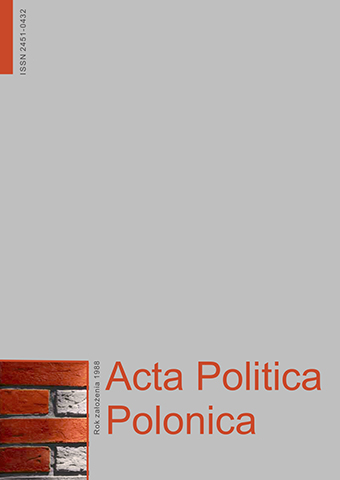
ISSN: 0867-0617
OAI




Issue archive /
1/2011 (24)
Prädispositionen polnischer Außenpolitik: Russland – Polen – Deutschland
(Predispositions Polish foreign policy: Russia – Poland – Germany)
| Authors: |
Norbert
Marek
Pierre-Frédéric Weber Instytut Zachodni, Poznań |
| Keywords: | Polish foreign policy, Poland, Russian, Germany |
| Data publikacji całości: | 2011 |
| Page range: | 27 (5-31) |
Abstract
In this article, the authors take issue on the sufficiency and defining appropriateness of Polish foreign policy in relation to Germany and Russia only in terms of geopoliticaland historical. At the same time trying to answer the question of how a change in the practice of foreign policy by the new conservative-liberal coalition (since 2007) ismerely a change of style, and how much real qualitative change in the approach of Warsaw to Russia and Germany. In relation to Germany becomes pronounced distancingfriendly policy, where political interaction is less dominated by the politics of history. Recent events related to the accident Smolensk also helped to break the existing climateof distrust between Moscow and Warsaw and possible policy slow approximation. Numerous acts of solidarity, both Russian society as well as Russia’s political elite alsoallow you to trust that the normalization of relations between Poland and Russia will continue.
Bibliography
| 1. | Afanasjew J., Groźna Rosja, Warszawa 2005, Oficyna Naukowa. Afanasjew J., Kamienna Rosja, martwy lud, „Gazeta Wyborcza“, 26.01.2009. |
| 2. | Bieleń S., O stosunkach polsko-rosyjskich, , w: Ekspertyzy i analizy pracowników ISM, Instytut Stosunków Międzynarodowych 9/2005, Warszawa. |
| 3. | Bosacki M., USA a my: coraz dalej, „Gazeta Wyborcza“, 20.07.2009. |
| 4. | Buras P., Gelingt Europa gemeinsam? Polens Europapolitik und die deutsche Ratspräsidentschaft, Zentrum für Internationale Beziehungen und KonradAdenauer-Stiftung, Warschau 2007. |
| 5. | Christ S., Der Kampf mit den Deutschen geht weiter, „Spiegel“, 4.02.2006. |
| 6. | Déclaration commune sur la sécurité et la défense, Sommet Franco-Polonais, Palais de l’Elysée – Jeudi 5 novembre 2009, http://www.elysee.fr/.../download/?mode=press& filename=091105declaration_defense_Sommet_franco-polonais.pdf (Zugriff am 20.11.2009). Eberhardt A., Stosunki Polski z Rosją„ Rocznik Polskiej Polityki Zagranicznej“, 1 (2006). |
| 7. | FAZ, Merkel verteidigt Zentrum gegen Vertreibungen in Berlin, „Frankfurter Allgemeine Zeitung“, 2.12.2005. |
| 8. | Gniazdowski M., Kwestie historyczne w polskiej polityce zagranicznej, „Rocznik Polskiej Polityki Zagranicznej“, 1 (2006). |
| 9. | Gostmann P., Fensteröffner – Sendungsbewusste – Grenzposten. Eine Typologie zur Repräsentation Europas und verschiedener europäischer Nationen im kulturellen Gedächtnis polnischer Parlamentarier, w: D. Bingen, P.O. Loew, K. Wóycicki, (red.): Die Destruktion des Dialogs. Zur innenpolitischen Instrumentalisierung negativer Fremd- und Feindbilder, 2007. |
| 10. | Kaczyński J.: Niemcy podważają prawo Polaków do ziem zachodnich„ Gazeta Wyborcza“, 4.06.2009. |
| 11. | Kloth H.M., Polnischer Minister poltert gegen Schröder und Merkel, „Spiegel“, 30.04.2006. |
| 12. | Köhler P., Polens neue Kartoffel, „Taz“, 26.06.2006. |
| 13. | Krejčí O. Geopolitics of the Central European Region. The View from Prague and Bratislava, Bratislava: Veda, Publishing House of the Slovak Academy of Science, 2005. |
| 14. | Kratochvil P., Cibulková P., Beneš V., Foreign policy, rhetorical action and the idea of otherness: The Czech Republic and Russia, „Communist and PostCommunist Studies“ 39 (2006). |
| 15. | Kuźniar R., Droga do wolności. Polityka zagraniczna III Rzeczypospolitej, Warszawa, 2008, Wydawnictwo Adam Marszalek. |
| 16. | Lang K.-O., Czas na nowy realizm. Perspektywy stosunków polsko-niemieckich w Unii Europejskiej, „Dialog (Berlin)“ 2005, Nr, 69–70. |
| 17. | Lawrow S., Bierzcie przykład z Rosji i uznajcie realia, „Gazeta Wyborcza“, 10.09.2008. |
| 18. | Lesser G., Die Polen sind geknickt, „Badische Zeitung“, 01.09.2009. |
| 19. | Madajczyk P., Polsko-niemieckie dyskusje o historii, „Rocznik Polsko-Niemiecki“, 2001/2002, nr 10. |
| 20. | Medwedew D., Katyń to przykład fałszowania historii, „Gazeta Wyborcza“, 07.05.2010. |
| 21. | Meller S., Jak rozmawiać z Rosją, „Polski Przegląd Dyplomatyczny“, 2008, nr 41. |
| 22. | Piekło J., Rosja w kryzysie a sen o imperium – polska perspektywa, „Analizy i Opinie“ 2009, nr 95, Instytut Spraw Publicznych, Warszawa, http://www. isp.org.pl/ (Zugriff am 2.11.2009). |
| 23. | Schuller K., Causa Steinbach. Organisiertes Schweigen in Polen, „Frankfurter Allgemeine Zeitung“, 17.11.2009. |
| 24. | Troebst S., Vertreibungsdiskurs und europäische Erinnerungskultur. Deutschpolnische Initiativen zur Institutionalisierung. Eine Dokumentation, Osnabrück 2006. |
| 25. | Urban T., Skubiszewski: „Konfrontation mit Bonn beenden“. Der Außenminister plädiert für eine deutsch-polnische „Interessengemeinschaft“, „Süddeutsche Zeitung“, 4.04.1990. |
| 26. | Wilke M., Europa różnych pamięci, „Tygodnik Powszechny“, 3.06.2009. |
| 27. | Wojciechowski M., Radziwinowicz W., Rehabilitacja dla ofiar Katynia, „Gazeta Wyborcza“, 01.06.2010. |
| 28. | Zielonka J., Europe as Empire. The Nature of the Enlarged European Union, Oxford University Press, 2007. |